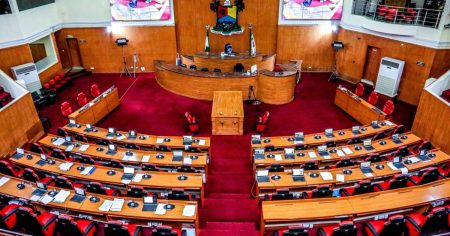The specter of fuel scarcity looms large over Lagos and other parts of Nigeria, triggered by a strike initiated by petroleum tanker drivers. The drivers allege harassment and unwarranted treatment by officials of the Lagos State Government and the Federal Ministry of Transportation, leading to a halt in fuel loading activities. This disruption, which began over the weekend, has sparked fears of imminent fuel shortages across the affected regions, threatening to disrupt daily life and economic activities. The situation is further compounded by the concerns raised by telecommunication companies, who fear a potential network blackout due to the disruption in diesel supply, a crucial resource for powering their base stations.
At the heart of the dispute lies the enforcement of the e-call-up system, a digital platform implemented by the Lagos State Government to manage truck movement along the Lekki-Epe corridor. Introduced in September 2024 to alleviate traffic congestion, the system has become a point of contention between the government and tanker drivers. While the Lagos State Government maintains that it is merely enforcing the established system and dismisses the drivers’ claims as blackmail, the drivers, represented by the Nigerian Association of Road Transport Owners (NARTO), contend that they are being unfairly targeted, subjected to harassment, and their vehicles seized and damaged without just cause. This stark contrast in perspectives fuels the ongoing impasse and exacerbates the looming fuel crisis.
The National President of NARTO, Yusuf Othman, has voiced the grievances of the tanker drivers, highlighting instances of alleged physical assault, vehicle damage, and arbitrary fines imposed by government officials. He emphasizes the essential role tanker drivers play in the fuel supply chain, underscoring that refineries and depots cannot function without their services. Othman’s statements reveal the depth of the drivers’ frustration and the potential for the strike to escalate if their concerns remain unaddressed. He explicitly states the connection between the strike and the lack of fuel loading, directly linking the potential fuel scarcity to the actions of the government task force. The drivers’ refusal to load fuel serves as a potent pressure tactic, bringing the issue to the forefront and demanding immediate attention from the authorities.
The Lagos State Government, however, remains steadfast in its position, asserting that the enforcement actions are necessary to maintain order and prevent the Dangote Refinery axis from descending into the same chaotic gridlock that previously plagued Apapa. The Permanent Secretary of the Lagos State Ministry of Transportation, Wale Musa, has reiterated the government’s commitment to upholding the e-call-up system and dismissed the drivers’ complaints as attempts at blackmail. This unwavering stance underscores the government’s resolve to maintain control over traffic management in the area, even at the risk of exacerbating the fuel supply disruption. The conflicting narratives and the lack of immediate resolution point towards a protracted standoff that could further deepen the impending fuel crisis.
The potential ramifications of the tanker drivers’ strike extend beyond fuel scarcity, impacting the telecommunications sector significantly. Telecommunication companies, represented by the Association of Telecommunications Companies of Nigeria (ATCON), have expressed grave concerns about the possibility of a widespread network blackout. Their reliance on diesel-powered generators to maintain their base stations makes them particularly vulnerable to disruptions in diesel supply. With some reserve tanks already at critical levels, the continued strike poses a serious threat to network operations, potentially leading to service disruptions that could cripple communication networks across the country. ATCON President, Tony Emoekpere, has stressed the urgency of the situation, highlighting the critical role of telecommunications infrastructure and the need for immediate intervention to avert a national emergency.
The looming fuel crisis and potential network blackout underscore the interconnectedness of various sectors within the Nigerian economy. The standoff between the tanker drivers and the government, if unresolved, could have far-reaching consequences, disrupting daily life, hindering economic activities, and potentially jeopardizing public safety. ATCON’s appeal to the governors of Lagos and Ogun states, as well as security agencies and petroleum unions, highlights the need for a swift and decisive resolution to safeguard Nigeria’s critical infrastructure and prevent a national crisis. The situation demands immediate attention from all stakeholders to find common ground and avert the potentially devastating consequences of a prolonged disruption in fuel supply and telecommunications services. The potential for widespread economic disruption and public inconvenience underscores the urgent need for dialogue and compromise to resolve this escalating crisis.














